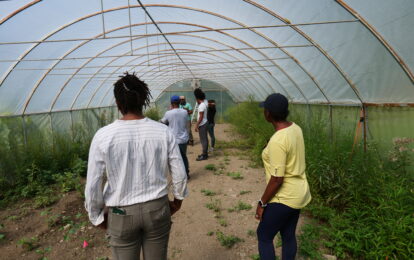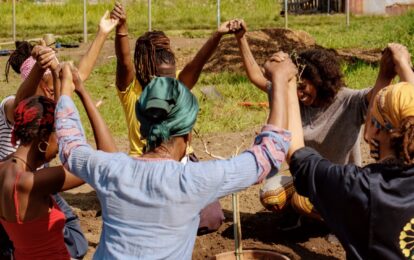ORFC 2026 8 – 9 Jan
ORFC 2026 8 – 9 Jan
Policymakers are increasingly recognising the potential of organic farming to help meet emissions reduction targets and to improve biodiversity on farmed land. Organic sector bodies are working with the UK Government and the devolved administrations in Scotland and Wales to develop Organic Action Plans aimed at driving growth in organic farming.
This participatory session invites landworkers, activists and organisations interested in supporting agroecological transformations to come together to discuss how we can strengthen our collective movement ecology to have the biggest impact.
What happens if landowners entrust their land to more distributed and diverse forms of ownership and governance than a single bloodline? Might a culture of diversity lead to even greater resilience?
Want advice about starting a community land-based project? The Ecological Land Cooperative share their learnings from 15 years of developing agroecological smallholdings for new entrants to ecological farming. The aim is to demystify the journey of buying community-owned farmland. The session will explore how to develop a viable business plan, finance your project, write planning applications, choose governance structures, and ensure good relationships between community owners and tenants.
In our interactive, reflective and embodied session, Mama D, Sui Searle and Samson Hart will discuss our relationships to land, belonging, spirituality, resilience and resistance within ourselves and our movements. We look towards understanding land as belonging, sovereignty, homeland, or identity beyond capitalism and we re-imagine co-liberation through land and spiritual practice. We will share our experiences in relation to specific questions, then open these up to wider discussion and reflection.
The youth branch of the LWA - FLAME - invites you to an intergenerational story sharing space. We will listen and share stories from older and younger generations on building a youth-led movement for agroecology. How can we increase awareness of agroecology and food justice in generations facing a widening disconnect from the land? What techniques can young people learn from older generations, and what can young people teach them?
Shifting how we talk about food, how we think about food, and how we relate to food is directly tied to the fight to ensure future life on this planet. As Black, Indigenous, and diasporic people of color (BIPOC) food leaders have long argued, dominant food narratives perpetuate extractive and exploitative norms rooted in white supremacy culture - prioritising profit over collective wellbeing. Without intentionally addressing deep narratives to change the way we think about…

Black Farmer Fund (BFF) was created by Black farmers who were frustrated with the limited financing options available to them, with the hopes of creating a funding vehicle that would challenge the racial injustices and wealth inequalities faced by Black Food actors. BFF is by us, for us, with a community of 12 Black farmers and food systems entrepreneurs from across the state leading the fund’s governance and making decisions around which applicants receive funding.
…
Agroecology, food sovereignty, climate justice and antipoverty economics aim to value all life by ending power relations, including sexism, racism and every form of discrimination. A women’s movement with a practical perspective on agroecology, includes all who identify as women and/or as antisexist, not only to create spaces free of discrimination but to revalue the 'unseen' work that mainly women and gender marginalised people do. The global economy could not function without this work. Our…
